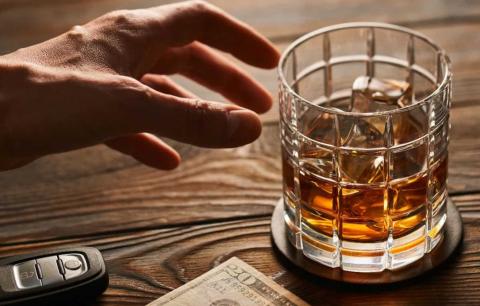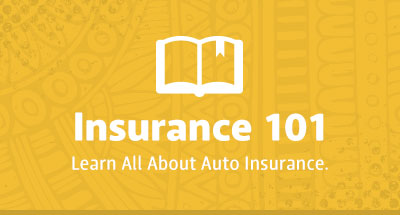Can You Get Car Insurance After a DUI?

Impaired driving goes by many names: drunk driving, driving while intoxicated, and even driving under the influence. No matter what term is used, impaired driving simply means that a person’s ability to safely operate a motor vehicle has been compromised by alcohol or other drugs that change the function of the brain and body.
Impaired driving is a serious issue and affects more than just those involved in drunk driving incidents. The misuse or abuse of alcohol and other substances greatly increases the chance of injuries — especially behind the wheel.
Driving after drinking is deadly, yet it continues to be an issue across the United States. Driving while impaired comes with extreme consequences including getting arrested, or worse, being involved in a traffic crash that causes serious injury or death.
If you have received a Driving Under the Influence (DUI), Driving While Intoxicated (DWI), or Operating Under the Influence (OUI) violation, and are worried about obtaining car insurance after a DUI or similar offense, Access can help alleviate concerns and guide you through the process.
In this blog, we will explain how to get cheap car insurance with a DUI and ease some of your worries along the way.
Driving Under the Influence (DUI) vs. Driving While Impaired (DWI)
Federal laws don't distinguish between Driving Under the Influence and Driving While Impaired offenses because there is not a nationwide definition of either violation. However, many states define and punish DUI and DWI offenses differently and the two violations often refer to similar-but-separate driving behaviors.
-
Driving Under the Influence (DUI)
DUI stands for Driving Under the Influence and occurs when someone operates a vehicle with alcohol in their bloodstream.
While the federal legal blood-alcohol content (BAC) limit is 0.08%, some states may pursue DUI charges at BAC levels of 0.01%, depending on the driver's age.
In some states, a DUI can be issued without the officer checking blood-alcohol content with a breathalyzer. In other instances, a person can be charged with a DUI based on erratic driving behavior, the suspicion of the influence of alcohol, or a field sobriety test.
-
Driving While Impaired (DWI)
DWI means Driving While Impaired, but is defined in some states as Driving While Intoxicated.
There is no difference between a DUI and DWI charge when DWI is defined as driving while intoxicated.
In states recognize them as separate charges, DWI generally refers to driving while impaired by drugs (either prescribed or recreational).
Marijuana Drug Impaired Driving Laws
Every state has laws dealing with alcohol-impaired driving and drug-impaired driving. Unlike laws for drinking and driving, laws that address drugged driving are nuanced, difficult to enforce and prosecute, and vary substantially by state.
Currently, 18 states have zero tolerance or non-zero per se laws for marijuana. Per Se laws make it illegal to drive with amounts of specified drugs in the body that exceed set limits.
- 9 states have zero tolerance for THC or a metabolite
- 3 states have zero tolerance for THC but no restriction on metabolites
- 5 states have specific per se limits for THC
- 1 state (Colorado) has a reasonable inference law for THC
Since these laws vary by state, you should research and find further information and specific state marijuana-related laws.
Drinking and Driving Statistics
Alcohol is a major factor in traffic accidents. Based on data from the U.S. Department of Transportation, National Highway Traffic Safety Administration (NHTSA), there was an alcohol-impaired traffic fatality every 48 minutes in 2017.
Teen Drinking and Driving:
Teenagers should always be educated on the risks of riding with an impaired driver and driving under the influence. Young drivers should be aware of how alcohol consumption and drug use can impact the ability to drive.
According to DUI experts, drivers under the age of 21 are 17 times more likely to experience a fatal car crash when their BAC is .08%, compared to driving with no alcohol in his/her system.
Some of the biggest factors that aid in preventing teens from drinking and driving include parental monitoring, zero tolerance laws, restrictions on the legal drinking age, and graduated driver licenses.
Drinking and Driving Laws in Arizona
In Arizona, it is unlawful for any person who is under the influence of intoxicating liquor or any drugs to drive or be in physical control of any vehicle.
When you apply for and accept the privilege to drive a vehicle in Arizona, you give consent to test for blood alcohol concentration or drug content (BADC) if you are arrested for driving while under the influence of intoxicating liquor or drugs (DUI). This is known as the Implied Consent Law.
When a law enforcement officer has reason to believe you have been driving while under the influence, the officer will request that you submit to a BADC test of your blood, breath, urine, or other bodily substance to measure the amount of alcohol or drugs present in your bloodstream.
DUI
A DUI refers to a person with an alcohol concentration of 0.08% or more (0.04% for commercial drivers).
- First offense: You will be jailed for no less than 10 consecutive days and fined no less than $1,250. You will also be required to undergo alcohol screening, education, or treatment. It is also required you equip any vehicle you operate with a certified ignition interlock device in addition to performing community service.
- Second and subsequent offenses: You will be jailed for no less than 90 days, fined no less than $3,000, and your license will be revoked for 12 months. You will also be required to undergo alcohol screening, education, or treatment and to equip any vehicle you operate with a certified ignition interlock device, in addition to community service.
Extreme DUI
An Extreme DUI refers to a person with an alcohol concentration of 0.15% or higher.
- First offense: You will be jailed for no less than 30 consecutive days with no eligibility for probation or suspended sentence and fined no less than $2,500. You will also be required to undergo alcohol screening, education, or treatment. In addition to required community service, you will need to equip any vehicle you operate with a certified ignition interlock device.
- Second and subsequent offenses: You will be jailed for no less than 120 days, fined no less than $3,250, and your license will be revoked for 12 months. You will also be required to undergo alcohol screening, education, or treatment. In addition to required community service, you will need to equip any vehicle you operate with a certified ignition interlock device.
Aggravated DUI
An Aggravated DUI refers to a person who:
- Receives a DUI while their license is suspended, revoked, or canceled
- Receives a third DUI within 84 months
- Receives a DUI while a person under the age of 15 is in the vehicle
- Receives a DUI or refuses to submit a blood alcohol content test while under an ignition interlock device requirement
If you receive an Aggravated DUI, you will be sent to prison for no more than two years and in addition to any other penalty required by law, your license will be revoked for one year.
You will also be required to undergo alcohol screening, education, or treatment and to equip any vehicle you operate with a certified ignition interlock device and will be ordered to perform community service.
Certified Ignition Interlock Device
A Certified Ignition Interlock Device is a breath alcohol testing instrument that connects to the ignition and power system of a vehicle. Upon entering a vehicle, a driver must blow into the device before attempting to turn the ignition. If the driver’s alcohol level is above a certain number, the vehicle will not start. While the vehicle is operating, the driver must blow into the device at random intervals.
Drinking and Driving Laws in Indiana
Indiana prohibits Operating a Vehicle While Intoxicated (OWI) also known as Driving While Intoxicated (DWI) or Driving Under the Influence (DUI).
Indiana’s OWI laws make it illegal to drive any vehicles while using alcohol or drugs. The DUI laws in Indiana involve blood alcohol concentration (BAC) limits, criminal sentences including jail time and fines, driver's license suspensions, and implied consent to alcohol and drug testing if you’re driving.
OWI
Indiana’s OWI laws prohibit all motorists from operating a vehicle with a blood alcohol concentration (BAC) of .08% or more.
- First Offense: If a driver's BAC reaches 0.08% then they will be convicted of an OWI charge. A first OWI with a BAC of 0.08% to 0.15% or using a controlled substance commits a Class C misdemeanor, punishable by up to 60 days in jail and a fine of up to $500.
- Underage Drinking: Indiana law also subjects anyone under the legal drinking age in Indiana (21 years old) to an even lower BAC level of 0.02%. Those under 21 with a BAC between 0.02% and 0.08% can receive a Class C infraction or ticket punishable by up to a $500 fine.
Extreme OWI
An Extreme OWI applies to a person with an alcohol concentration of 0.15% or higher.
- First Offense: If a person is found driving a vehicle with a BAC of 0.15% or above, it's a Class A misdemeanor. In addition, if a vehicle is operated in a way that endangers another person, it’s a Class A misdemeanor. Class A misdemeanors can result in up to one-year incarceration and up to a $5,000 fine.
- OWI with a minor: A Level 6 felony is constituted if the driver is 21 years or older and operating a vehicle while intoxicated with at least one passenger under 18 years old. It’s a Level 6 felony if an individual is convicted of their second DUI within 5 years, causes serious bodily injury, or kills a law enforcement animal. Sentences for Level 6 felonies range from 6 months to 2.5 years of incarceration with up to $10,000 fines.
- Commercial Drivers: It's illegal to operate a commercial vehicle with a BAC of over 0.04%. If you do so, you will lose your commercial driver’s license (CDL) for at least one year, or three years if driving hazardous materials. Commercial drivers are unable to get probationary licenses to work.
How to Get Car Insurance After a DUI
If you have a DUI on your record, chances are you’ll need to find a new car insurance provider. Most standard insurance companies will either drop DUI offenders or astronomically raise rates.
Despite what you’ve heard, you do have options for car insurance with a DUI. Shop around for car insurance quotes so you can understand the range of the rates you’ll be working with. Eliminate any extremely high cost providers and companies that won’t accept you due to your record.
Keep in mind that there are always local options that may suit you better, and the only way to find out is to by looking. Non-standard auto insurance companies like Access don’t punish drivers with DUIs.
SR-22 Proof of Insurance
Most DUI or DWI offenders who get their license and driving privileges reinstated will need an SR-22 proof of insurance form.
An SR-22 is simply a form you or your insurer must file with your state’s Department of Motor Vehicles (or Department of Licensing) to verify that you have valid insurance coverage. This is commonly required in most states following a DUI or DWI offense. An SR-22 is also needed for other offenses under which a driver’s license would be revoked or suspended, such as excessive speeding, a violent crash, or other serious moving violations.
An SR-22 proof of insurance form is often necessary for up to three years following a suspended license, and most states will require newly reinstated drivers to carry insurance. If you cancel your coverage or switch insurers, your insurer is required to notify the state so police officers are alerted that you are a former DUI offender with canceled insurance coverage.
However, SR-22 isn’t a kind of “special” or “high-risk” insurance coverage. The same regulations and minimum requirements for insurance coverage apply to former DUI offenders as they do for any driver with a clean history. The only difference for a DUI offender is that they have a mark on their driving record.
If you're looking to learn more about how a DUI could affect your rate or coverage requirements, or if you need help submitting DUI-related forms like an SR-22, visit our website.






